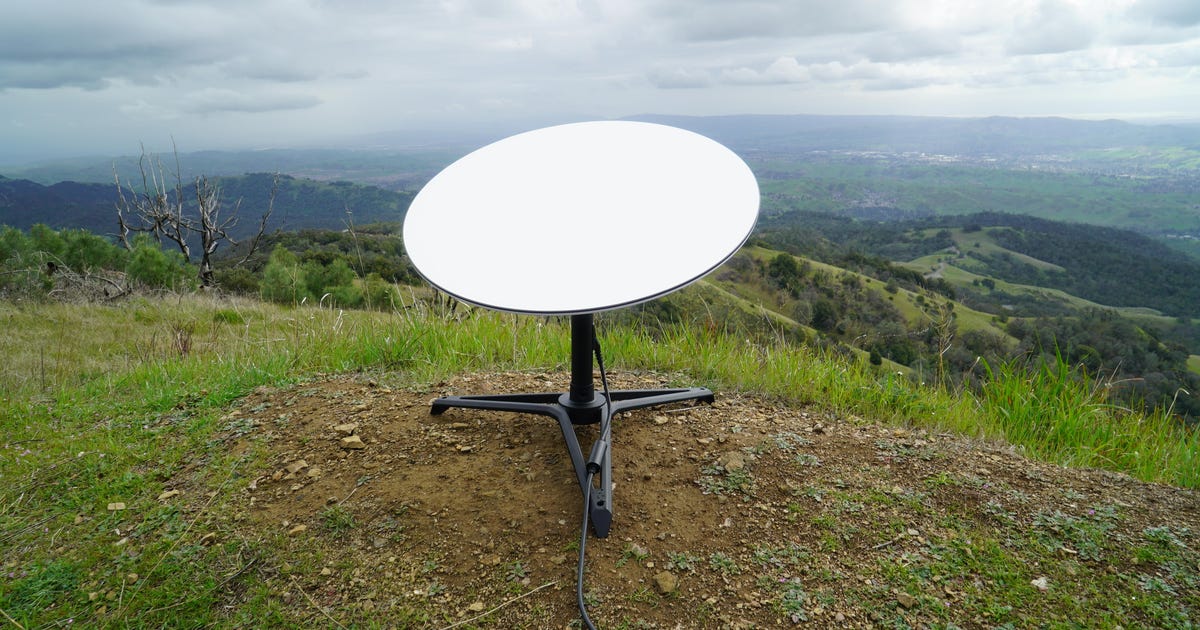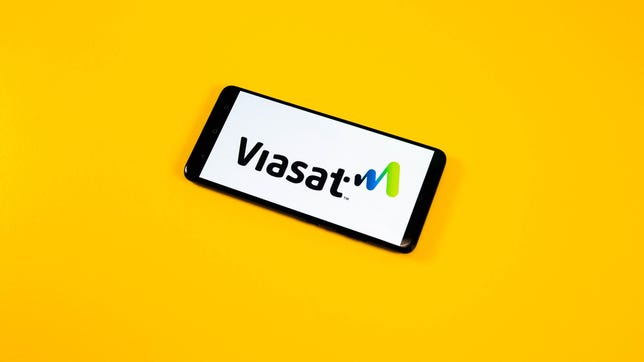
In this article:
Elon Musk’s SpaceX is the satellite internet service provider that grabs the majority of the headlines, whether sending Starlink terminals to the front lines in Ukraine or partnering with T-Mobile to help provide greater cellular connectivity across the US. The latest twist is the impending December introduction of a Starlink data cap. But Musk’s ISP is just a small part of the picture.
It’s not breaking news that many in rural America lack adequate internet access. There’s some disagreement on the exact numbers, but a growing chorus of voices agrees the US has work to do to increase and expand its internet infrastructure. The good news? The White House aims to make our internet connections less expensive by partnering with internet service providers in conjunction with the government’s Affordable Connectivity Program.
In the meantime, satellite internet is the one broadband connection type currently available to people in the rural areas of all 50 states. It doesn’t match the internet speed capabilities of fiber or cable connections. Still, satellite broadband can play a key role when internet access is vital (and the pandemic has shed light on just how critical it is). But which of the satellite internet providers is best?
Frankly, there aren’t many choices out there. But here’s what you’ll find when you explore satellite internet access, starting with a quick look at how the best satellite internet providers compare.
Read more: Best Rural Internet Providers of 2022
Satellite internet provider comparisons
| HughesNet | Starlink | Viasat | |
|---|---|---|---|
| Max speeds | 25Mbps download, 3Mbps upload | 50-500Mbps download, 10-40Mbps upload | 12-150Mbps download, 3Mbps upload |
| Lowest monthly cost | $50-$100 | $110 | $65-$300 |
| Regular monthly rate | $65-$150 | $110-$500 | $85-$400 |
| Contract | 2 years | None | 2 years |
| Monthly equipment costs | $15 or $450 one-time purchase | $599 one-time purchase (or $2,500 for Premium) | $13 or $299 one-time purchase |
| Data allowance | 15-100GB | Unlimited | 40-300GB |
Let’s dig a little deeper to see what each satellite internet provider brings to the table.
Best satellite internet providers of 2022
Sarah Tew/CNET
HughesNet scores strong points for its consistency of internet service regarding download speed. Whereas other satellite internet providers’ speeds might vary from location to location, HughesNet’s max download speed — though not as fast on the top end as others — is available to all customers in all remote areas. What’s more, in 2018, a Federal Communications Commission report on broadband noted that HughesNet fared best among all participating providers for delivering actual median download speed at 150% or higher of the advertised speed.
Things to consider? While HughesNet has no hard data limits, you’ll find its speeds reduced to 1 to 3 megabits per second once you hit your monthly data allowance. HughesNet also came up short in J.D. Power’s 2021 US Residential Internet Service Provider Satisfaction Study, landing dead last in the South region for overall customer satisfaction.
HughesNet
You’re receiving price alerts for HughesNet
HughesNet satellite internet plans and pricing
| HughesNet Gen5 | HughesNet Gen5 | HughesNet Gen5 | HughesNet Gen5 | |
|---|---|---|---|---|
| Max speeds | 25Mbps download, 3Mbps upload | 25Mbps download, 3Mbps upload | 25Mbps download, 3Mbps upload | 25Mbps download, 3Mbps upload |
| Starting monthly cost | $65 | $50 | $65 | $100 |
| Regular monthly rate (after six months) | $65 | $75 | $90 | $150 |
| Contract | 2 years | 2 years | 2 years | 2 years |
| Data allowance | 15GB | 30GB | 50GB | 100GB |
Sarah Tew/CNET
Viasat satellite internet lets you choose an internet plan that best fits your needs. Those internet service plans include some slower than what you’ll find with HughesNet and several faster. Packages also come with more data — up to 300GB — though, similar to HughesNet, you may find your data “deprioritized” if you go over your monthly data allowance.
Viasat swerved last year when it came to equipment. It used to be the case that Viasat didn’t allow you to buy equipment. That might have seemed like a bonus when you consider that HughesNet charges $450 if you want to buy your gear (which includes installation costs) and Starlink devices currently cost $599. But that also meant you couldn’t avoid the additional monthly equipment rental fee of $13. But now, you can buy your Viasat equipment for a one-time purchase of $299, which is cheaper than its rivals.
Viasat
You’re receiving price alerts for Viasat
New Viasat satellite internet plans and pricing (not available in all markets)
| Choice 25 | Choice 50 | Choice 75 | Choice 100 | Choice 125 | Choice 150 | |
|---|---|---|---|---|---|---|
| Max speeds | 25Mbps download, 3Mbps upload | 50Mbps download, 3Mbps upload | 75Mbps download, 3Mbps upload | 100Mbps download, 3Mbps upload | 125Mbps download, 3Mbps upload | 150Mbps download, 3Mbps upload |
| Starting monthly cost | $65 | $85 | $120 | $170 | $250 | $250 |
| Regular monthly rate (after 3 months) | $85 | $120 | $170 | $250 | $350 | $350 |
| Contract | 2 years | 2 years | 2 years | 2 years | 2 years | 2 years |
| Data allowance | 40GB | 60GB | 100GB | 150GB | 300GB | 300GB |
Sarah Tew/CNET
When eccentric billionaire Elon Musk isn’t garnering headlines for his tumultuous Twitter buyout, he’s making noteworthy progress with his company SpaceX’s Starlink satellite internet project. Granted, this satellite provider is still in the early stages — there’s a waiting list at present and currently just over 400,000 active users across the globe — but the early results, as shared by our own John Kim, are promising.
First, at 250Mbps, the max download speeds are higher than HughesNet and Viasat’s. It also features a latency of between 20 and 40 milliseconds, compared to HughesNet and Viasat’s more typical range of 450 to 700ms.
Second, Starlink keeps things simple by going with only two satellite internet plans — Starlink and Starlink Premium. The newly announced Premium tier should be available soon and offers a different satellite dish and equipment for higher download speeds, but it also comes at a heftier price.
Lastly, while the equipment fee of $599 — and a whopping $2,500 for Starlink Premium — is steeper than those charged by either HughesNet or Viasat, Starlink does not require a two-year contract and currently features genuinely unlimited data. But that will be changing when it institutes a still-generous 1TB cap in December, after which users’ speeds will be throttled until the end of the billing cycle. Once you consider the decent upload speed, these are considerable upgrades for anyone stuck with satellite internet. Those facts could undoubtedly change as Starlink grows, but they’re intriguing aspects of the pitch that could help set it apart from the competition.
Starlink satellite internet plans and pricing
| Plan | Max speeds | Starting monthly cost | Regular monthly rate | Contract | Data allowance |
|---|---|---|---|---|---|
| Starlink | 250Mbps download, 20Mbps upload | $110 | $110 | None | Unlimited |
| Starlink Premium | 500Mbps download, 40Mbps upload | $500 | $500 | None | Unlimited |
What’s on the horizon for satellite internet providers?
Stay tuned to CNET for the latest developments with Starlink as it presses further into its plans and aims to expand its coverage.
According to Ookla speed test data from Q2 of 2022, Starlink was a clear winner as the fastest satellite provider on average. Its median download speed in the US was 62.53Mbps, while Viasat was a distant second place with 23.68Mbps download speed. HughesNet was close behind Viasat at 22.62Mbps download speed. It’s safe to say that Starlink is beginning to change expectations of how satellite internet can perform.
It should also be mentioned that further disruption may come from another multibillionaire, Jeff Bezos, as Amazon’s Project Kuiper also aims to enter the field. While nowhere near the stage that Starlink has achieved thus far, Project Kuiper did turn some heads when its prototype delivered speeds up to 400Mbps in recent iterations.
Innovations from low Earth orbit satellites will be just one piece of the puzzle of better delivering the internet to the millions of households still unable to find a reliable broadband source. We’ll keep this post updated as your options (hopefully) improve.
Satellite internet FAQs
Is Starlink better than Viasat?
Potentially, yes. If you are a current user of Starlink internet service, then you’re experiencing a broadband connection with higher maximum download and upload speeds than Viasat (250Mbps/20Mbps compared to 150Mbps/3Mbps). Starlink also has lower latency than Viasat (20-50ms vs. 450-700ms), making gaming and other online activities that require fast response times much more feasible on Starlink than Viasat.
That said, more than 500,000 potential customers are still waiting to try Starlink. If you hop on the site now and try to get in line, you’ll be met with a message that “some orders may take 6 months or more to fulfill,” and some parts of the country will not be serviceable until late 2023. That’s remarkably unhelpful for the 14 million or so Americans still without access to broadband service, per the FCC’s most recent reports.
So, where Viasat wins is its availability to over 120 million households in the US right now. Suppose you’re in a rural or underserved area with few options for internet connectivity. In that case, Viasat can get you connected, whereas Starlink may be an option down the road, but it’s not an immediate solution.
Do all satellite internet providers have data caps?
Technically, none of them do. HughesNet and Viasat claim to offer “unlimited data” because neither charges overage fees, but each has a set data limit for its plans. If you hit that data limit before the end of your monthly billing cycle, there won’t be monetary penalties, but you will experience much slower, throttled speeds for the remainder of that month. So your data may not be capped, but I would call that practice limiting.
Starlink, right now, offers truly unlimited data. There’s no set data cap number after which it can begin to throttle or slow your internet speed. However, that significant advantage over its competitors will change in December when Starlink introduces its own data cap. The limit will be a sizable 1 terabyte of data per month (well above the data limits of HughesNet and Viasat), but it’s still a significant change from unlimited data.
Will Starlink be faster than HughesNet?
Yes. Starlink claims that customers can expect download speeds from 50 to 250Mbps. CNET’s John Kim tested the service in May last year and experienced average download speeds of around 78Mbps. Starlink is also due to roll out its Starlink Premium service soon, with expected download speeds between 150-500Mbps.
HughesNet, which relies on satellites in a much higher orbit than that Starlink uses — which means data takes a little longer to travel back and forth — offers plans with maximum download speeds of 25Mbps. That’s faster than some of the plans available with Viasat but no match for Starlink.





